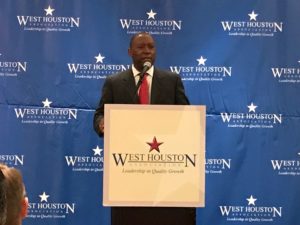“Whe n you find yourself in a hole, the first order of the business is to stop digging,” Mayor Turner speaking to the crowd of approximately 150 at the West Houston Association’s City Issues Forum on April 20th, 2017.
n you find yourself in a hole, the first order of the business is to stop digging,” Mayor Turner speaking to the crowd of approximately 150 at the West Houston Association’s City Issues Forum on April 20th, 2017.
The developers, engineers, lawyers, consultants, and elected officials that made up most of the audience were receptive to the Mayor’s message of working together to dig Houstonians out of this financial hole. The Mayor recognized many public officials who were working towards fixing our areas problems, including Houston City Council Members Jack Christie, Greg Davis, Amanda Edwards, Michael Kubosh, David Robinson, Brenda Stardig, and City of Spring Valley’s Mayor Tom Ramsey and West University Place Mayor Susan Sample.
Mayor Turner mentioned that one of the main advantages of his plan to reform City pensions is that it would eliminate the unfunded pension liability of $8 billion in 30 years. Turner emphasized that the City of Houston has been dealing (or not dealing) with its underfunded pension for nearly two decades. The Mayor noted that Houstonians, including employees and police officers, are now putting aside their differences to solve the issue.
The mayor said that last year, he inherited a nearly $150M budget deficit and found a way to balance the budget. This year, the City of Houston budget deficit will swell to $240M due to a spike in debt payments. Unlike last year, most of proverbial the low-hanging fruit has been picked and the Mayor announced that he would have to make hard choices, included layoffs of City of Houston workers and police officers.
Mayor Turner proposed his pension reform plan in 2016 with an expectation that it will pay off the city’s debt in 30 years. Turner’s proposal recalculates the city’s pension payments with the usage of lower investment return assumptions and aimed at retiring the debt in 30 years. This would increase the city’s annual costs. Turner noted that Houstonians’ taxes will not go up under the plan and he called it “cost-neutral” for the city. The mayor also highlighted that the city’s current and former firefighters, police officers, and city workers would not see a cut in their retiree checks; however, they might see smaller cost-of-living adjustments, higher employee payroll contributions, and a phasing out of the pension’s Deferred Retirement Option Plan, or DROP that will allow current employees bank retirement benefits early. Also, to bring the police and municipal funds to the table, the city has also agreed to inject $1 billion in bond proceeds into their plans to make up for past city underfunding.
Mayor Turner believes that our tax base must grow to keep the City of Houston thriving by attracting new businesses and making necessary investments to keep businesses and their employees want to stay in Houston. Hence, changes to existing budget allocations should be made in a deliberative process considering all affected stakeholders.
The Mayor answered questions and took comments after he concluded his remarks. Councilmember Jack Christie, identifying himself as a conservative, commented that he believed that the Mayor’s plan was the best and most practical option available to the citizens of Houston. TAG-Houston Chairman Jack Drake asked Mayor Turner what he thought of Oklahoma City’s recent adoption of a two-cent property tax (an additional cent for 10 years) to shore up infrastructure and pensions. Mayor Turner responded by saying that like the Rockets in their game against the Thunder, Houstonians needed to look at how up its game to outcompete Oklahoma City and other cities to keep Houston the best place to raise a family or grow a business.
Thanks again to all of our attendees and our sponsors, ABHR, Parkside, HCC, Costello, IDS, Dannenbaum, Bridgeland-Howard Hughes, LJA, MetroNational, Newland, Wolff, Micher, Severn Trent, Johnson Development Co., RPS Klotz, VanDeWiele, R.G. Miller, EHRA, and Radcliffe Bobbitt Adams, & Polley.

